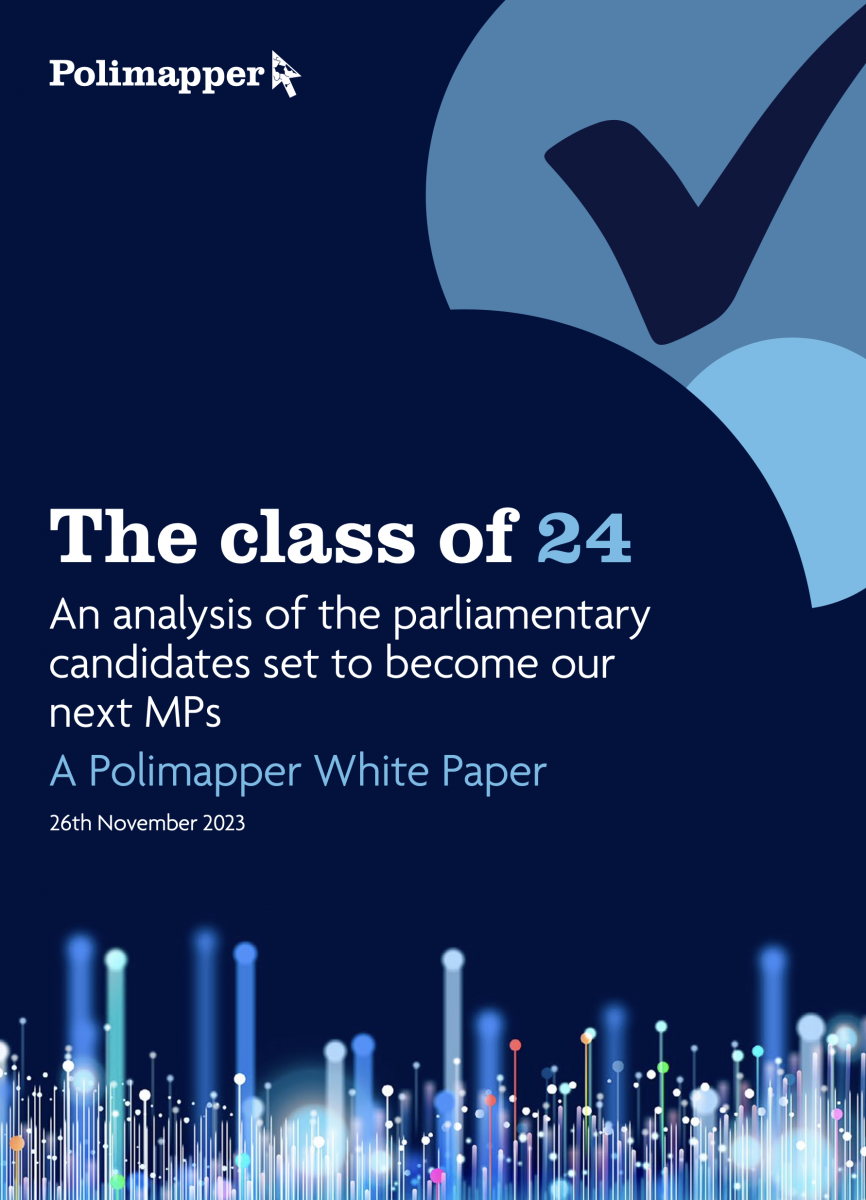A study into the parliamentary candidates standing at the forthcoming general election shows the next cohort is unlikely to be any more diverse than the present parliament.
- Only 39% of prime candidates (those in target seats or successor candidates) are women
- Only 10% are from an ethnic minority background
- A career spent working in or around politics is by far and away the most popular professional background.
- A ‘Local’ connection remains key to being selected as a candidate
A major new report released by the political mapping and visualisation platform, Polimapper, provides the first detailed aggregate analysis of those set to make up the next House of Commons.
With as many as 105 of Westminster’s 650 MPs retiring, displaced by the redrawing of parliamentary constituencies, or set to be replaced as their party’s candidate, change is coming to Westminster even before voters get to the polls.
Should Labour replace the 2019 Conservative landslide win in England and the SNP landslide win in Scotland, with a significant victory of its own, the proportion of newly elected MPs could even threaten the 1945 record of 51%.
Polimapper’s report, The Class of 24: An analysis of the parliamentary candidates set to become our next MPs, focuses on prime candidates, defined as a successor to an existing MP or a challenger in a key target seat that would be vulnerable under current polling.
By mid November 2023, some 275 of these 362 prime candidates (76%) – the pool from which the UK’s newly elected MPs will emerge - had already been selected.
Analysing the backgrounds of this prime candidate pool, Polimapper’s report has discovered some interesting and potentially controversial trends.
- Where there has been a sustained move to greater diversity in general elections since 1992, that progress is now set to stall.
- Among the candidates making up the Class of 24, just 39% are women. Currently 35% of MPs are women (225 of 650), while women and girls make up 51% of the population of England and Wales according to the 2021 Census.
- Leaders of the three main political parties this week released statements supportive of the campaign group 50:50 Parliament’s #AskHerToStand day, but with three quarters of prime candidates for the next parliament already selected, the figures show it will fall a long way short of this aim.
- Only 10% of prime candidates are from an ethnic minority background. This is at the same level as the current parliament where after the 2019 General Election 66 MPs (10%) were from ethnic minority backgrounds. The 2021 Census recorded 18% of the UK population belonging to a Black, Asian, mixed or other ethnic group.
- 17% of the Class of 24 have been educated at Oxford or Cambridge, compared to 22% of MPs elected at the 2019 general election.
- A professional background working in and around politics remains the dominant hinterland of choice for our next generation of MPs. Some 76 of the 275 candidates in the Class of 24 (28%) have spent the majority of their professional lives working ‘in and around’ politics. This compares to just five (1.8%) with a background in clinical medicine, or fifteen (5.5%) who can be regarded as having front line experience in science and technology.
- The existence of a current local connection appears to be the single most dominant characteristic of all those set to become our next generation of MPs. Some 70% of the Class of 24 were local to their constituency at the time of their selection, with a further 13% able to claim they had been so at some point in the past.
- 44% of prime candidates have already been elected to a local council that covers some part of their potential new Westminster constituency. These revelations only give fuel to the arguments of those such as the former foreign secretary, Lord Hague, who argue that ‘too much localism’ is giving us second rate MPs’.
Nathan Coyne, managing director, Polimapper, said of the findings of the White Paper, which were drawn from Polimapper’s extensive bank of candidate profiles: “The median length of an MP’s service is 13 years, so the impact of the recent parliamentary selections is likely to be felt on UK public life well into the 2040s.
“With three quarters of prime candidates in place, public affairs industry professionals can already begin the process of assessing what the next generation of MPs will mean for their campaigns, and issues of interest.
“Our suite of tools is designed to help them start that process, by both identifying who they need to be speaking with and engaging them using constituency level data.”













